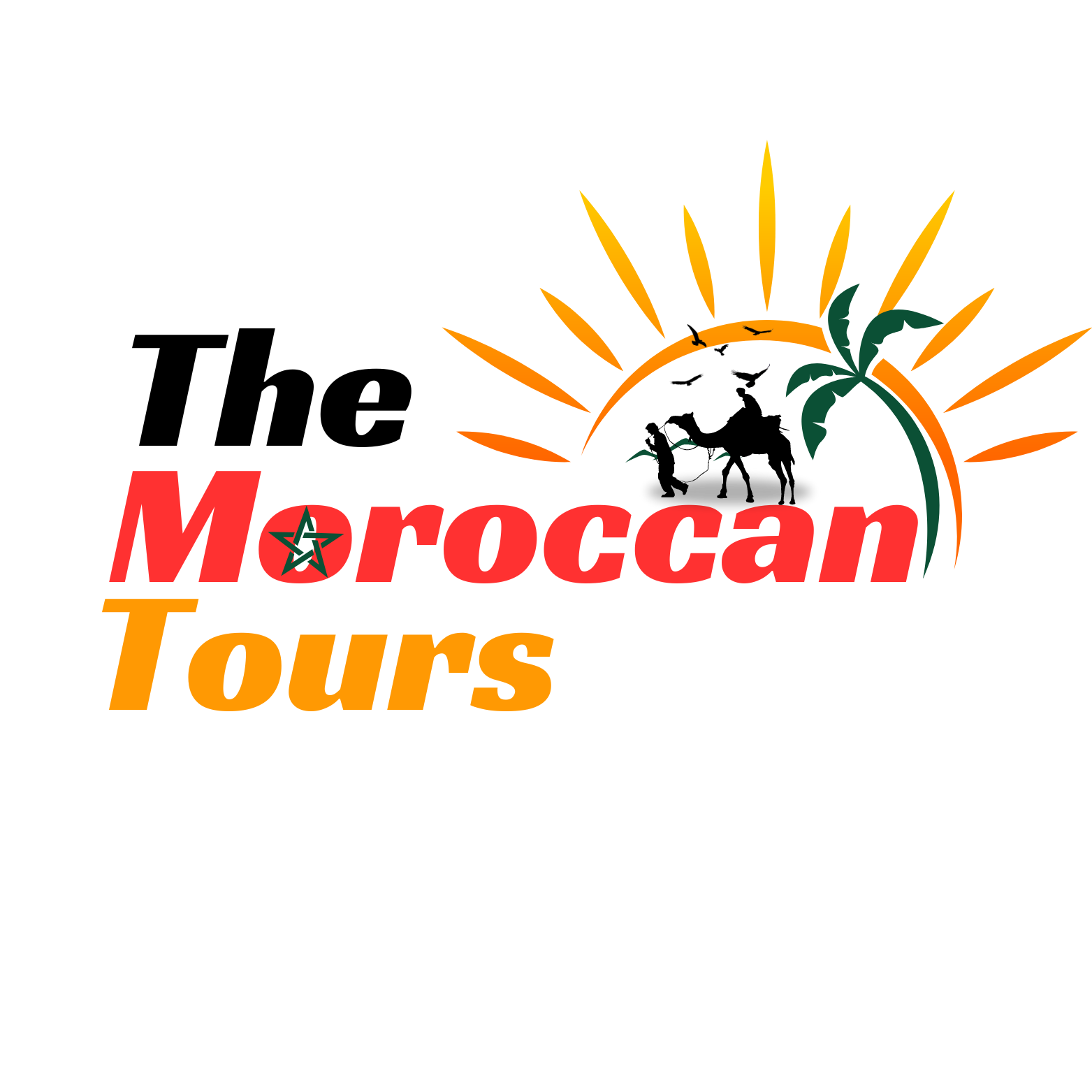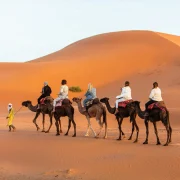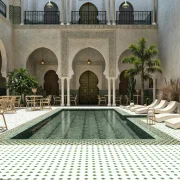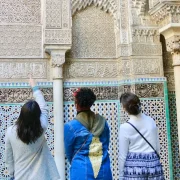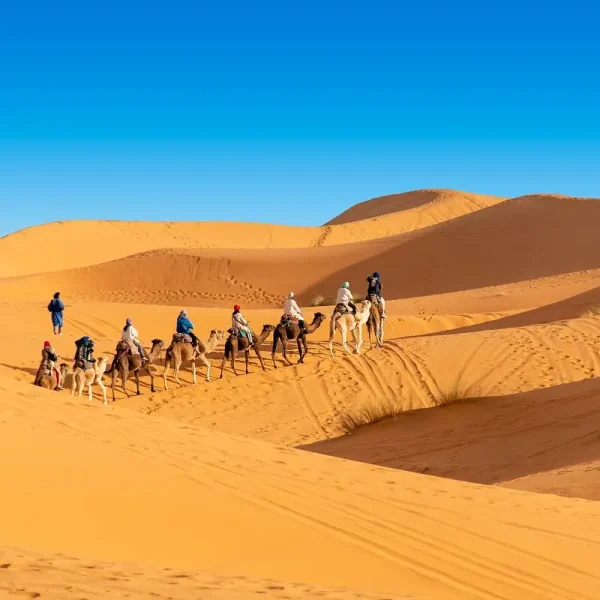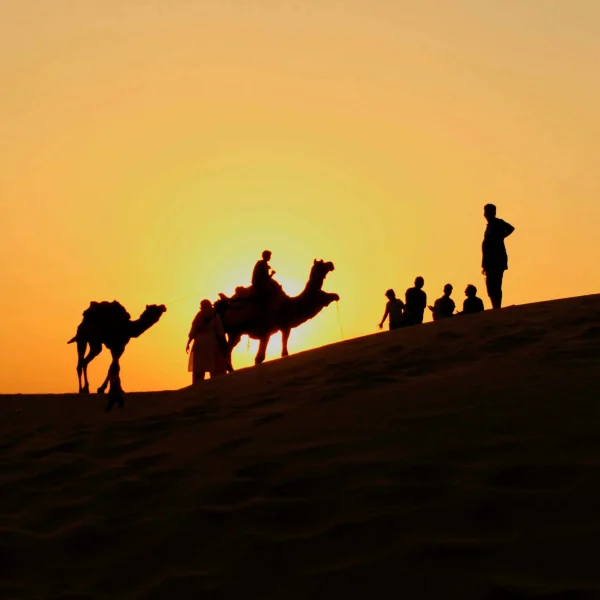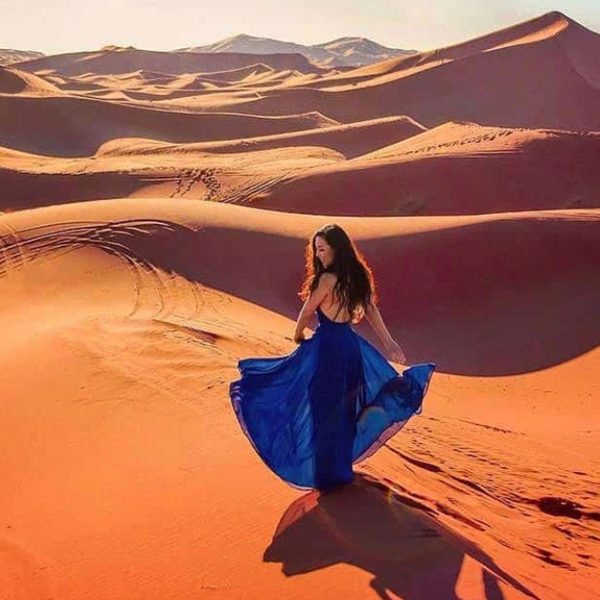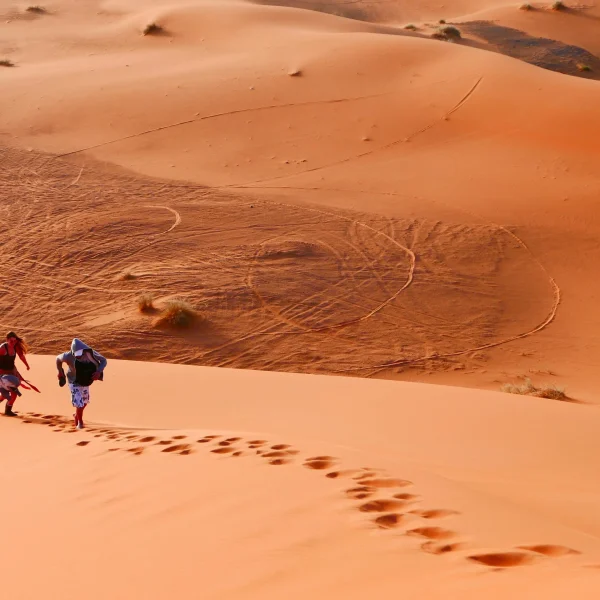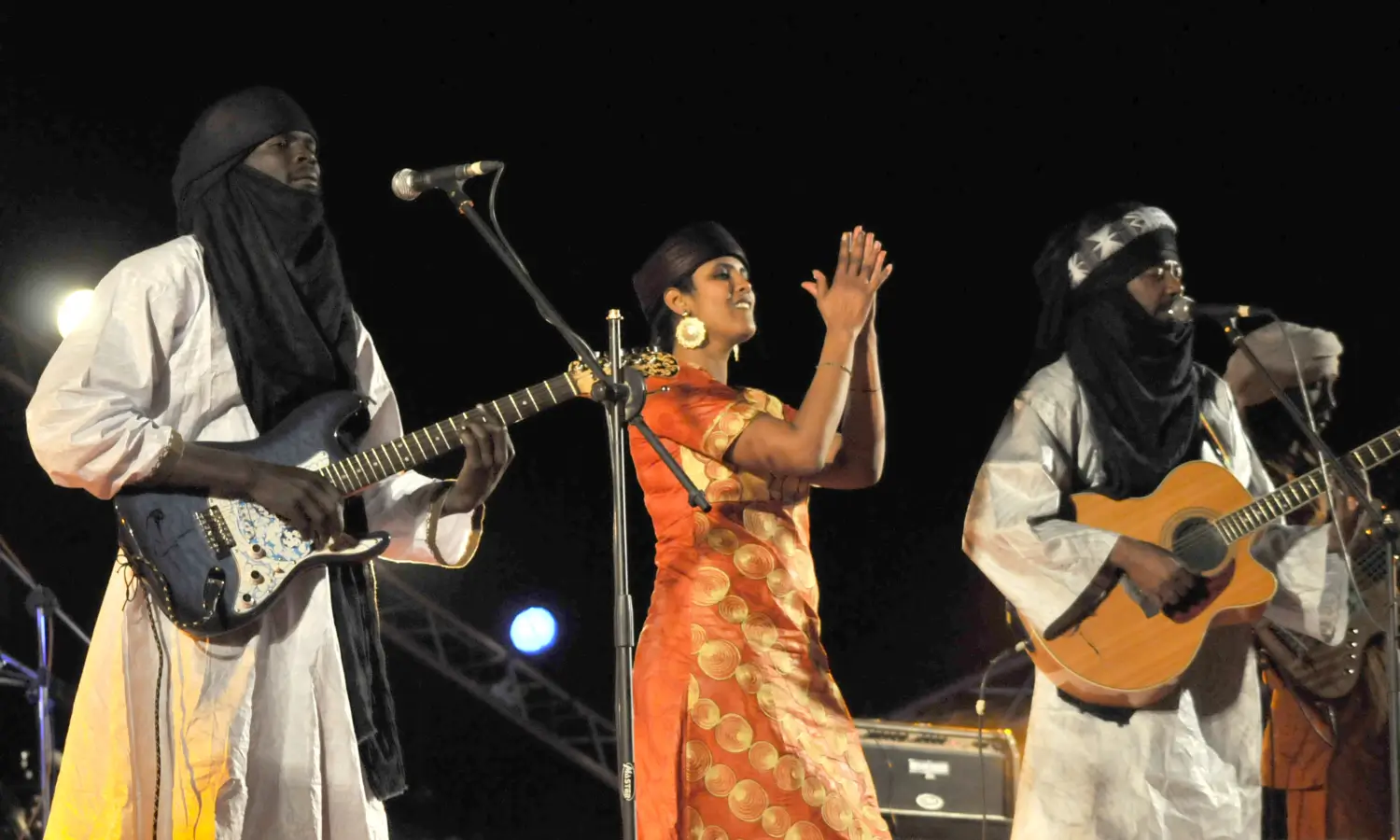
Festival des Nomades 2025 Unleashes Desert Magic
Table of Contents
ToggleFestival des Nomades 2025: A Cultural Celebration in Morocco’s Desert Gateway
Have you ever dreamed of dancing under the stars in the Sahara Desert, surrounded by ancient traditions and modern artistic expressions? I certainly have, and there’s no better place to experience this magical fusion than at the Nomads Festival (Festival des Nomades) in Mhamid El Ghizlane, Morocco. As someone who’s traversed deserts across three continents, I can tell you that this celebration stands apart as one of the most authentic cultural experiences you’ll ever encounter.
The Magic of Mhamid El Ghizlane’s Nomadic Heritage
Picture this: the sun setting over golden sand dunes, casting long shadows across the desert landscape as the sounds of traditional instruments begin to fill the air. The scent of spiced tea and freshly baked sand bread wafts through the evening breeze. This isn’t just any festival—it’s a gateway to understanding a way of life that has survived for centuries against the harsh backdrop of the Sahara.
Mhamid El Ghizlane, often called the “Gateway to the Desert,” sits at the edge of the Sahara in southern Morocco. Once a bustling stop on ancient caravan routes, this small town transforms each spring into a vibrant cultural hub during the Festival des Nomades. The 2025 edition promises to be the most spectacular yet, with four days of music, art, cuisine, and cultural exchange scheduled for April 10-13.
“The desert teaches us that life flourishes even in the most challenging environments. The Festival des Nomades celebrates this resilience and the rich cultural tapestry that nomadic peoples have woven across the Sahara for millennia.” – Festival Founder Ibrahim Sbai
For travelers looking to experience Morocco’s authentic cultural treasures, local tour operators like Morocco Joy Tours can arrange hassle-free journeys to the festival with transportation, accommodation, and guided experiences tailored to your preferences.
The Origins and Evolution of the Festival des Nomades
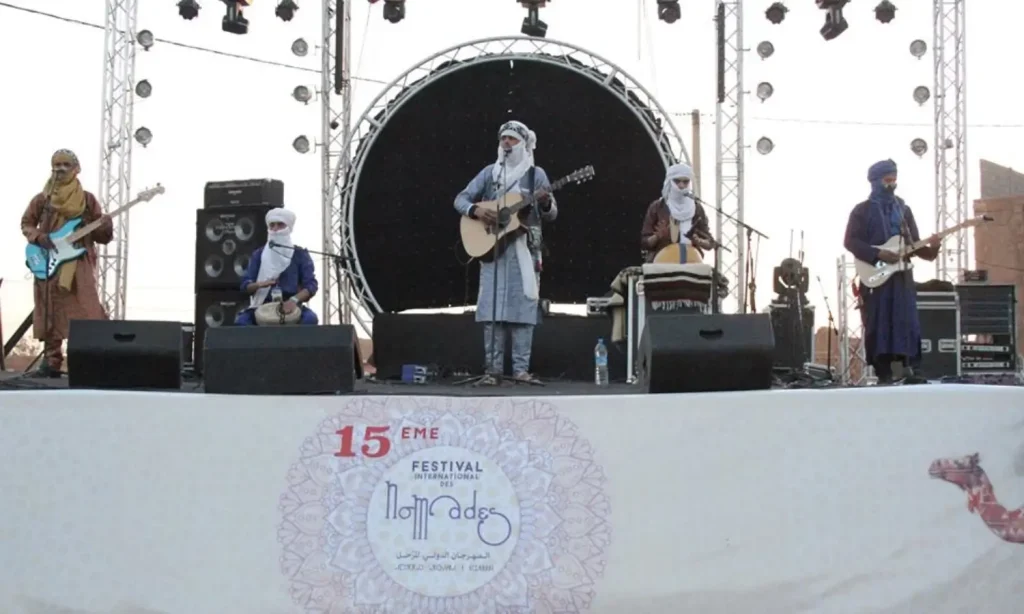
Historical Background of the Festival
The Festival des Nomades wasn’t born from a tourism board meeting or corporate sponsorship. Instead, it emerged organically in 2004 from a genuine desire to preserve the vanishing traditions of Morocco’s desert nomads. As climate change and modernization threatened the nomadic way of life, local community leaders and cultural activists united to create a platform where these ancient traditions could be showcased, celebrated, and passed on to younger generations.
What began as a small gathering of local tribes has blossomed into an internationally recognized cultural event that strikes a delicate balance—honoring authentic traditions while embracing contemporary artistic expressions inspired by nomadic heritage.
From Local Gathering to International Cultural Event
The transformation of the Festival des Nomades from a community celebration to an international cultural phenomenon speaks to its authentic appeal. Unlike many commercialized festivals, this event maintains its soul while expanding its reach. International artists now share stages with local performers, creating unique fusion performances that couldn’t happen anywhere else.
Every year, the festival attracts visitors from across the globe who come to witness this rare convergence of traditional and contemporary desert culture. The 2025 edition is expected to draw the largest crowd yet, with music lovers, cultural enthusiasts, and adventure travelers making the journey to this remote corner of Morocco’s southern reaches.
When planning your visit, seasoned travelers recommend booking with experienced local guides who understand the festival’s cultural significance and can provide context that enhances your experience tremendously.
What’s New for Festival des Nomades 2025
Key Dates and Schedule Highlights
The 2025 Festival des Nomades runs from April 10-13, with a carefully curated program that balances traditional elements with exciting new additions. Here’s what you can look forward to:
Thursday, April 10th: The festival kicks off with evening concerts (by reservation only) that serve as a perfect introduction to the musical landscape of the Sahara. For those arriving early, there’s also a digital security workshop in the morning—a modern touch that reflects the festival’s evolution.
Friday, April 11th: The official opening ceremony takes place in the desert—a breathtaking experience as the sun sets over the dunes. Like the previous day, there’s a morning digital security workshop for those interested in the intersection of traditional cultures and modern technology.
Saturday, April 12th and Sunday, April 13th: The weekend brings the major musical evenings with reserved access to the proscenium. These nights feature the most anticipated performances and typically sell out well in advance.
Featured Artists and Performances
The 2025 lineup showcases the festival’s commitment to musical diversity while honoring desert traditions. Headliners include:
- Mîrkut: Enchanting Kurdish songs that transport listeners across borders
- Imarhan Timbuktu: Authentic Tuareg music straight from the heart of Mali
- Tarwa N Ayur: Mesmerizing Amazigh songs that connect past and present
- Mohamed Ali Ailla: Soulful Hassani songs that tell stories of desert life
- Saïd Chalaban Hongrie: Innovative Hassani/rock fusion that bridges continents
Additionally, beloved local groups like Daraa Tribes, Pigeons des Sables, and Rokba will perform traditional styles including Guedra, Ahidous, and Dqat Saif.
If you’re planning to attend, I strongly recommend booking accommodations and concert tickets in advance. Many experienced Morocco travelers find that working with knowledgeable local tour operators helps navigate the logistics while providing cultural context that enhances the festival experience.
The Cultural Significance of the Festival
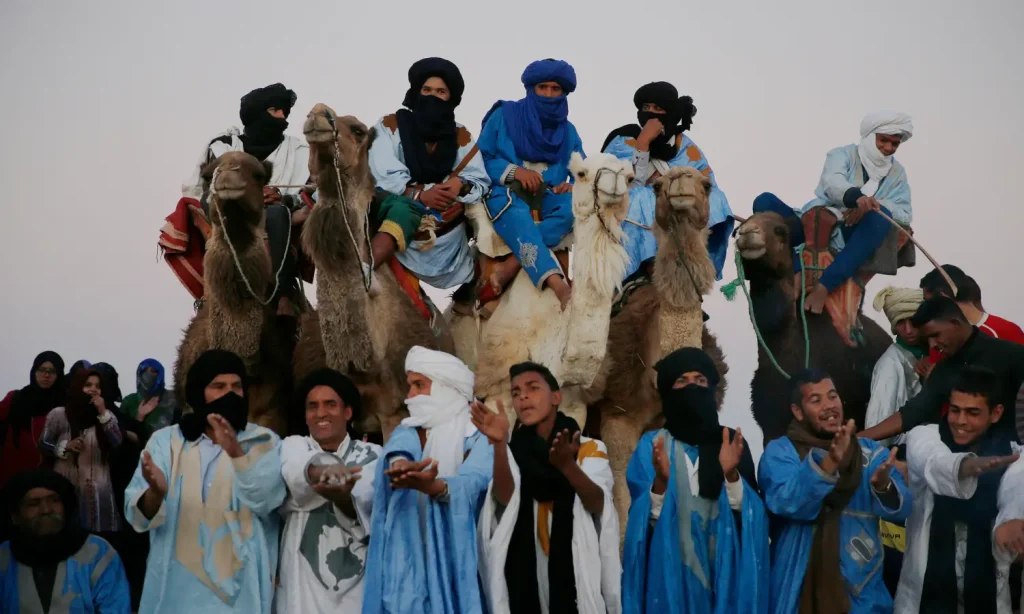
Preserving Nomadic Traditions in Modern Times
The Festival des Nomades isn’t just entertainment—it’s cultural preservation in action. As traditional nomadic lifestyles face increasing pressure from climate change, urbanization, and technological shifts, this festival serves as a vital link between past and present.
Throughout the four days, you’ll witness demonstrations of traditional nomadic activities that have sustained desert communities for centuries:
- Camel racing demonstrations (Ellaz): Experience the thrill of this ancient sport
- Preparation of sand bread (Mella): Learn how nomads bake bread using hot sand
- Sand Hockey (Mok’hach): Watch this unique desert sport that few outsiders ever see
- Nomad tent installation: Observe the sophisticated engineering behind these portable desert homes
These aren’t mere performances for tourists—they’re authentic practices shared by those who still maintain connections to nomadic ways of life.
The Festival’s Role in Cultural Exchange
What makes the Festival des Nomades truly special is its role as a cultural crossroads. Here, traditional Moroccan Saharan culture meets influences from Mali, Algeria, Mauritania, and beyond. The result is a rich tapestry of artistic expression that transcends borders while honoring the shared heritage of desert peoples.
The Forum des Nomads, featuring conferences and debates, creates space for meaningful dialogue about the challenges and opportunities facing nomadic communities today. These discussions often touch on sustainability, cultural preservation, and the delicate balance between tradition and modernity.
“The festival creates a unique space where visitors don’t just observe culture—they participate in it. This exchange enriches everyone involved and builds bridges of understanding that last long after the music fades.” – Festival Participant
When exploring these cultural dimensions, visitors often find that traveling with guides who have personal connections to nomadic traditions provides invaluable insights you simply can’t get from a guidebook.
Musical Performances: The Heart of the Festival
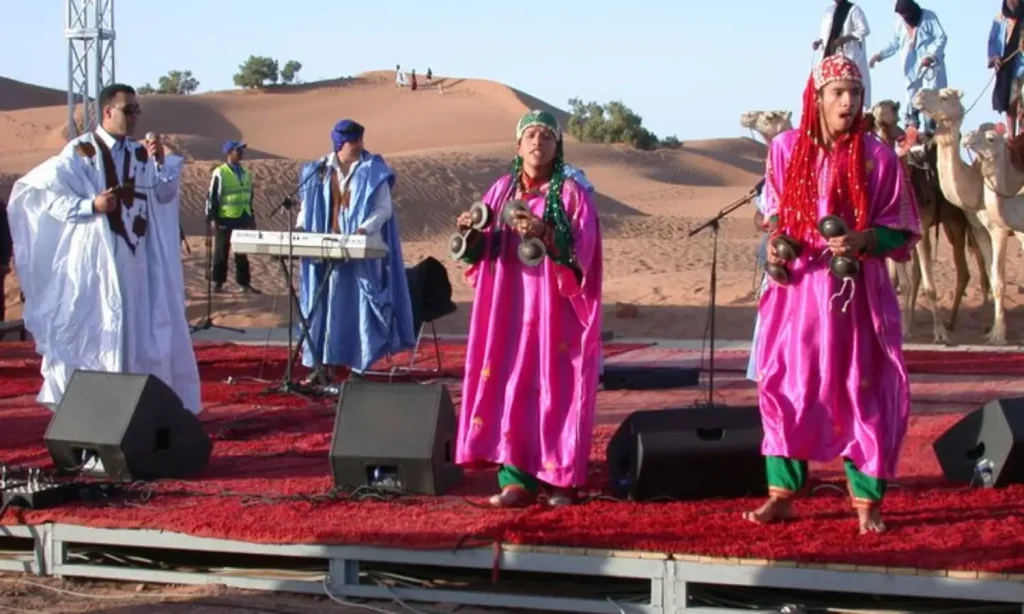
Traditional Nomadic Music and Dance
The musical heritage of nomadic peoples forms the beating heart of the Festival des Nomades. These aren’t just songs and dances—they’re living history, passed down through generations and carrying the stories, values, and emotional landscape of desert life.
The Guedra, a hypnotic traditional dance performed primarily by women, stands as one of the festival’s most powerful experiences. Dancers enter a trance-like state, their fingertips tapping out complex rhythms against goatskin drums as they tell stories without words. Meanwhile, the Ahidous brings communities together in circular formations, creating a sense of unity through synchronized movement and call-and-response singing.
Contemporary Artists Inspired by Desert Heritage
What makes the Festival des Nomades particularly exciting is the dialogue between traditional forms and contemporary expressions. Artists like Tarwa N Ayur and Saïd Chalaban Hongrie blend ancient desert rhythms with modern instrumentation and production techniques, creating music that resonates with both elders and youth.
These fusion performances often become the most talked-about moments of the festival, as they demonstrate how cultural traditions can remain relevant while evolving. For first-time visitors, experiencing this dynamic interplay between past and present is often eye-opening.
Visual Arts and Crafts at the 2025 Festival
Exhibition Spaces and Installations
Beyond music and dance, the Festival des Nomades transforms Mhamid El Ghizlane into an open-air gallery. Desert-inspired installations emerge from the sand, while photography exhibitions document the changing face of nomadic life across the Sahara region.
The 2025 edition promises expanded exhibition spaces, with a special focus on environmental themes. Artists will explore the relationship between nomadic cultures and their desert environment, highlighting traditional ecological knowledge that has allowed communities to thrive in one of Earth’s most challenging landscapes.
Artisan Markets and Traditional Craftsmanship
The festival’s craft marketplace offers a rare opportunity to purchase authentic desert-made goods directly from the artisans who create them. Here you’ll find:
- Handwoven textiles with designs specific to different nomadic tribes
- Intricate leather work, from practical water vessels to decorative pieces
- Jewelry incorporating silver, amber, and semi-precious desert stones
- Traditional musical instruments crafted from local materials
Each piece tells a story, and speaking with the craftspeople (through an interpreter if needed) adds a layer of meaning to your purchases. Many visitors find that their most treasured souvenirs come from these personal connections with artisans.
Many experienced travelers recommend arranging your festival visit through local tour operators who can connect you with artisans and provide cultural context for the crafts you encounter.
Culinary Experiences at the Festival des Nomades
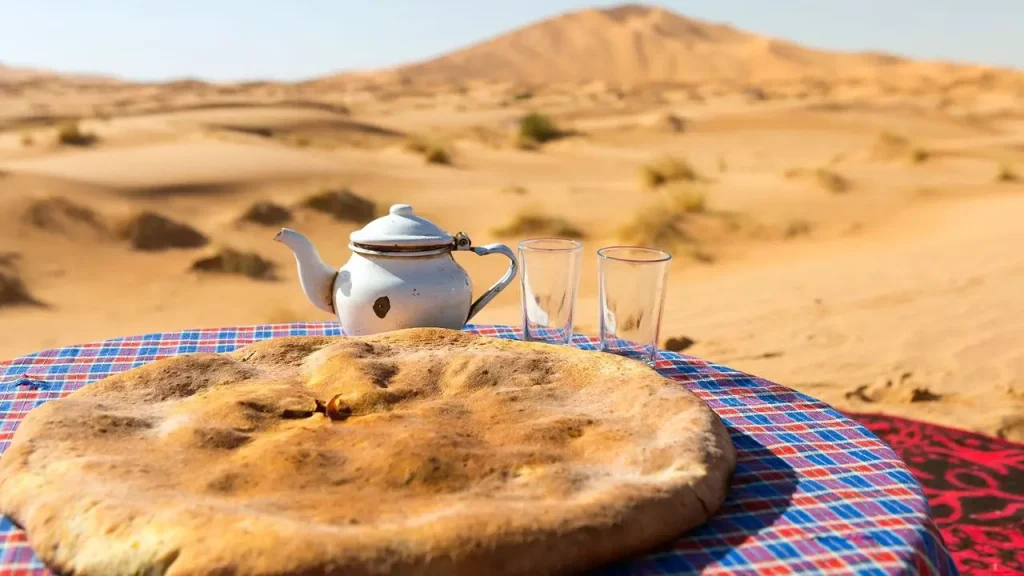
Authentic Nomadic Cuisine
The Festival des Nomades offers a genuine taste of desert gastronomy—cuisine developed to sustain life in one of the world’s most challenging environments. Traditional dishes like mechoui (slow-roasted lamb), tagines infused with desert herbs, and light couscous variations showcase the ingenuity of nomadic cooks who create remarkable flavors with limited ingredients.
Don’t miss the opportunity to try sand bread (khobz ramal), baked in the hot sand of the desert—a technique that predates conventional ovens by thousands of years. Paired with fresh mint tea prepared in the traditional way, it’s a simple yet unforgettable culinary experience.
Cooking Demonstrations and Food Workshops
The 2025 festival expands its culinary program with hands-on workshops where visitors can learn traditional cooking techniques from nomadic cooks. These interactive sessions offer more than just recipe instructions—they provide insight into the cultural significance of food preparation and the resourcefulness required for desert living.
Practical Guide to Attending the Festival
Transportation to Mhamid El Ghizlane
Reaching Mhamid El Ghizlane requires some planning, as it’s located about 520 kilometers from Marrakech. Your options include:
- Private Transport: Many visitors choose to book with a reliable local tour company that can handle the journey with comfortable vehicles suited for desert conditions.
- Public Transportation: Budget travelers can take a combination of buses, with connections in Ouarzazate and Zagora. This option requires more time and flexibility.
- Rental Car: For experienced drivers comfortable with Morocco’s roads, renting a 4×4 vehicle offers flexibility to explore the region.
The journey itself is part of the experience, taking you through the stunning landscapes of the Atlas Mountains and along the Draa Valley with its palm groves and kasbahs.
Accommodation Options for Festival-Goers
Mhamid El Ghizlane offers several accommodation options that cater to different preferences and budgets:
- Desert Camps: For the most authentic experience, stay in a traditional nomadic camp in the desert. These range from basic tents to luxury “glamping” options.
- Hotels: The festival offers special 1/2 board hotel packages for April 10-11, which can be booked through the official registration.
- Guesthouses: Family-run riads and guesthouses in Mhamid provide a comfortable middle ground between hotels and camping.
Accommodation fills quickly during the festival, so early booking is essential—typically 3-6 months in advance. Working with experienced local tour operators can simplify this process and often unlocks access to authentic accommodation options not available through standard booking platforms.
Sustainable Tourism and Community Impact
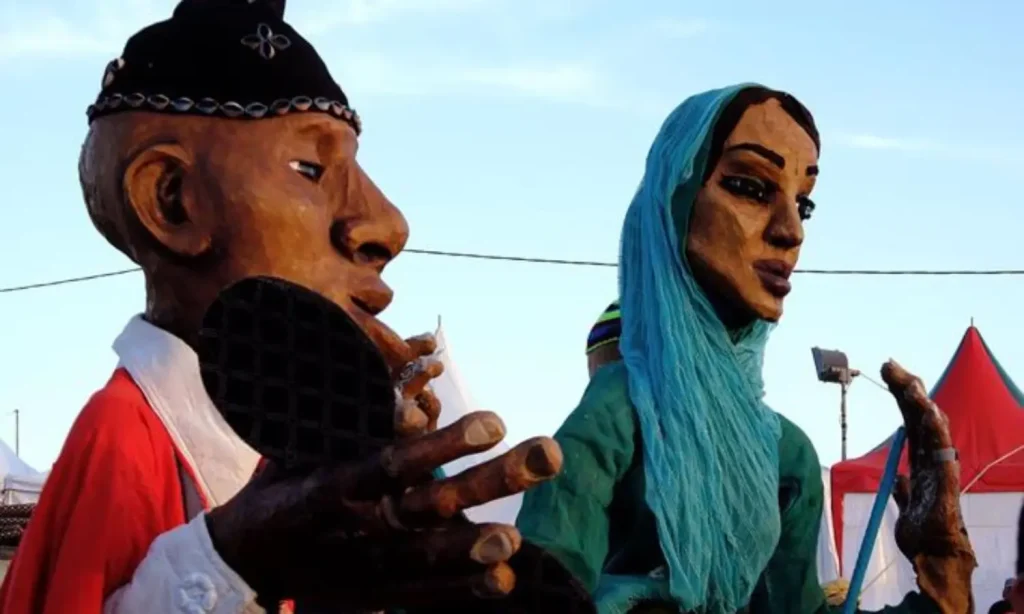
How the Festival Benefits Local Communities
What sets the Festival des Nomades apart from many cultural events is its deep commitment to community benefit. Revenue from the festival directly supports local families, funds cultural preservation efforts, and provides economic opportunities in a region where traditional livelihoods face increasing challenges.
By attending, you’re not just having an amazing experience—you’re contributing to the sustainability of nomadic cultural practices and supporting the communities that maintain them.
Eco-Friendly Initiatives at the 2025 Festival
The 2025 edition places increased emphasis on environmental sustainability—a natural extension of the nomadic ethos of living lightly on the land. New initiatives include:
- Water conservation programs
- Waste reduction and recycling systems
- Solar power for festival infrastructure
- Educational programs about desert ecosystem preservation
Responsible travelers appreciate these efforts to minimize the festival’s environmental footprint while maximizing its cultural impact.
Beyond the Festival: Exploring the Surrounding Sahara
Desert Excursions and Activities
While the festival itself offers plenty to experience, many visitors extend their stay to explore the breathtaking Sahara landscape. Popular activities include:
- Camel treks across the dunes
- Stargazing in some of the world’s darkest skies
- Visits to oases and ancient desert trading posts
- 4×4 excursions to remote sand seas
For safety and to maximize your experience, these activities are best arranged through experienced local guides who understand the desert environment and have connections with nomadic communities.
Connecting with Local Nomadic Communities
Some of the most profound experiences come from spending time with nomadic families who still maintain elements of traditional desert lifestyles. These encounters offer authentic cultural exchange far beyond what’s possible in typical tourist settings.
Local tour operators with deep community connections can often arrange these meaningful interactions in a way that’s respectful and beneficial to the communities involved.
Why the Festival des Nomades 2025 Should Be on Your Travel Itinerary
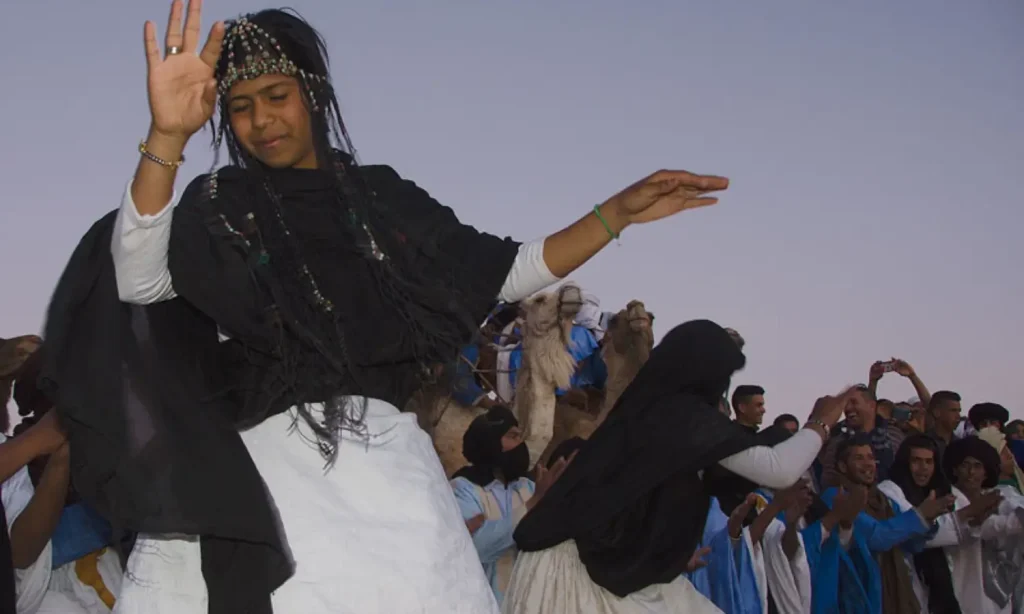
The Nomads Festival (Festival des Nomades) in Mhamid El Ghizlane is more than just an event—it’s an unforgettable journey into the heart of nomadic culture, set against the mesmerizing backdrop of the Moroccan Sahara. From camel races to hypnotic desert concerts under a starry sky, every moment is steeped in authenticity and wonder. Whether you’re a culture enthusiast, a desert adventurer, or simply seeking an off-the-beaten-path experience, this festival promises memories that will last a lifetime.
🌟 Travel Tip:
To fully immerse yourself in the magic of the Nomads Festival, we highly recommend booking your trip with The Moroccan Tours. As a trusted local tour operator, they specialize in crafting personalized desert experiences, including festival packages, Sahara excursions, and cultural adventures across Morocco. Their expert guides and deep understanding of nomadic traditions will make your journey even more special.
Ready to explore the soul of the Sahara? Let The Moroccan Tours be your gateway to Morocco’s hidden gems!
Whether you’re drawn by the music, the art, the cuisine, or the desert landscape itself, the 2025 festival promises memories that will stay with you long after the sand is shaken from your shoes. There’s something magical about sitting under the star-filled Saharan sky, surrounded by ancient traditions and new friendships, that changes how you see the world.
“The desert speaks to something deep within us—a sense of wonder, of timelessness, of connection to something greater than ourselves. The Festival des Nomades invites us to listen.” – Festival Visitor
For those seeking an authentic, meaningful travel experience that goes beyond surface-level tourism, the Festival des Nomades 2025 awaits. Just be sure to plan ahead, respect local customs, and consider traveling with experienced local guides who can help you navigate both the physical and cultural landscape of this extraordinary event.
4 FAQs About the Nomads Festival
1. When is the Nomads Festival held in 2025?
The Nomads Festival 2025 will take place from April 10 to April 13 in Mhamid El Ghizlane, Morocco.
2. What makes the Nomads Festival unique?
It’s a rare cultural event celebrating nomadic life with traditional activities like camel racing, sand bread making, desert music, and nomadic forums.
3. How do I get to Mhamid El Ghizlane for the festival?
You can reach Mhamid El Ghizlane via a 7-8 hour drive from Marrakech or Ouarzazate. Morocco Joy Tours offers private transfers and guided tours.
4. Is the festival family-friendly?
Absolutely! The festival welcomes travelers of all ages, offering activities that are educational, fun, and culturally enriching for families.
